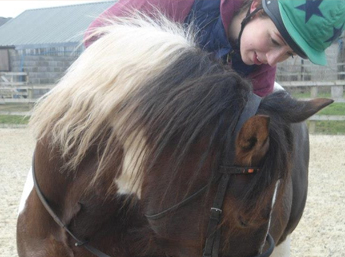Upcoming Webinars

Relationship between age-related cognitive and behavioural changes in senior cats
Dr Patrizia Piotti
25 September 2024 at 07:30pm : £20.00
The lifespan of companion cats is slowly increasing as a result of better care and progress of veterinary medicine. Surveys of cat owners indicate that 28% of cats aged 11-14 years develop signs of behavior and cognitive decline, and that the prevalence of these signs rises to over 50% in cats aged 15 years or older. It is therefore clear that veterinary professionals need to know how to prolong healthy ageing in cats. This session will provide an overview of feline ageing and will describe recent studies looking at the relationship between behavioural changes and the performance in cognitive tests in senior cats.
If you are a FABC member, please log-in to enable your free booking

Inducing and measuring positive affective state in horses through a personality-based lens
Loni Loftus MSc BSC(Hons) SFHEA CCAB
6 November 2024 at 07:30pm : £20.00
Maximising positive emotional welfare is a vital facet of good holistic welfare. In order to be able to evaluate positive emotional welfare in horse we must be able to induce and measure positive affect. This webinar will report on the results of research conducted into suitable methods to induce and measure affective state in equines whilst also considering the effect of personality on the intensity of emotional state experienced.
If you are a FABC member, please log-in to enable your free booking
ANNUAL CONFERENCE: "Lets Communicate" - Intra and Interspecies Interactions

Full Conference Pack
Available Until 2 December 2024 : £85.00
The Fellowship of Animal Behaviour Clinicians are delighted to be able to invite you to our annual conference on the 2 December 2023. We have an outstanding line up of internationally recognised experts in the field of animal behaviour and veterinary medicine who will be speaking on our conference topic of “Lets Communicate” – Intra and Interspecies Interactions
If you are a FABC member, please log-in to enable your member discount

Owner Communication for human behaviour change
Tamsin Durston RVN, CAB, mAPDT, PTTLS, BA(hons), BSc(hons), MSc
Available Until 2 December 2024 : £20.00
Tamsin’s presentation aims to help you:
1. Summarise relevant models of human behaviour change which impact client-communication:
transtheoretical model of change
self-determination theory
self-efficacy and locus of control
social identity theories
2. Explain the concept, development, and goals of Motivational Interviewing when communicating with pet owners
3. Reflect upon the value of applying Motivational Interviewing techniques within clinical animal behaviour counselling
If you are a FABC member, please log-in to enable your member discount

Pheromonatherapy: Update on Clinical Applications
Prof. Daniel Mills BVSc PhD CBiol FRSB FHEA CCAB Dip ECAWBM(BM) FRCVS RCVS and EBVS European Veterinary Specialist
Available Until 2 December 2024 : £20.00
There is currently active debate concerning the value of pheromonatherapy for the management of problem behaviour, often with both claim and counterclaim referencing the scientific literature.
To some extent this reflects personal bias and/or a failure to appreciate the nature of either scientific inquiry and/or the concept of evidence based medicine.In this presentation I will review this debate as it relates to current data on the use of pheromonatherapy within the context of core scientific principles, a psychobiological approach to understanding the nature of problem behaviour and the nature of evidence based medicine. This facilitates the development of a rational basis forpractical guidelines relating to when it might be useful or not to recommend pheromonatherapy and other complementary interventions in practice.
If you are a FABC member, please log-in to enable your member discount

How animals communicate pain
Dr Matt Gurney BVSc CertVA PgCertVBM DipECVAA FRCVS
Available Until 2 December 2024 : £20.00
Understanding how animals communicate pain has enabled the development of validated tools that allow us as veterinary professionals to evaluate pain and monitor the efficacy of our treatments. There have been significant advances in this area in the past 20 years which we will review in this session. Despite these successes, there are still types of pain and certain pain presentations which remain a challenge to us as caregivers.
If you are a FABC member, please log-in to enable your member discount

Communication in street dogs – same-same but different
Dr Heather Bacon OBE BSc BVSc CertZooMed SFHEA MRCVS
Available Until 2 December 2024 : £20.00
This session will outline the geographical, learned and genetic factors that may influence the behaviour of free-roaming and ‘landrace’ dogs, to provide context for their behaviours.
It will then describe and discuss a range of behaviours that are common in free-roaming or ‘ancient’ dog breeds, with a focus on dog-dog and dog-human interactions. This session will be useful for anyone interested in better-managing dogs, or supporting owners of dogs, from a wide range of geographical backgrounds.
If you are a FABC member, please log-in to enable your member discount

Communicating with vets – never mind the dog, will the vet bite?
Dr Emma Brown BVSc PGDip MRCVS CCAB, RCVS Advanced Practitioner in Companion Animal Behaviour & Tom Rowland MSc CCAB (dogs) PhD candidate in Animal Behaviour & Welfare
Available Until 2 December 2024 : £20.00
Effective management of Behaviour cases depends on an integrated team approach with Animal Care Givers, Veterinary and Behaviour Teams working together. In this presentation we will look at how the relationship between the referring vet and the behaviourist should work, what can go wrong and how to avoid these pitfalls.
If you are a FABC member, please log-in to enable your member discount
Recorded Webinars

Inducing and measuring positive affective state in horses: A Delphi approach
Loni Loftus MSc BSC(Hons) SFHEA CCAB
Available Until 5 September 2024 : £20.00
Maximising positive emotional welfare is a vital facet of good holistic welfare. In order to be able to evaluate positive emotional welfare in horse we must be able to induce and measure positive affect. Unfortunately there is limited literature related to measuring positive affect in horses and therefore this Delphi consultation was undertaken as part of a larger research project to understand expert consensus on reliable methods to induce and measure positive affect in horses. The results and implications of this study will be discussed within this webinar with particular reference to their practical implications for those owning and working with horses.
If you are a FABC member, please log-in to enable your free booking

Fetching cats? Play behaviour in cats and implications for welfare
Dr Jemma Forman BSc (Hons), MRes, PhD
Available Until 17 October 2024 : £20.00
This talk covers research on general play behaviour in domestic cats (covering both cat-cat and cat-owner play), including a lesser-known playing style of fetching. Cats are generally stereotyped for being ‘lazy’ and unmotivated to engage in play, however play might look a little different to what we might expect. Playing has many benefits for both the cat and owner, including: preventing aggression towards humans; acting as a substitute for predation on real animals; and improving cat-owner communication. This talk also discusses the importance of cat-centred interactions during play sessions and the importance of owner education of cat play behaviours.
If you are a FABC member, please log-in to enable your free booking

A role for Client-Centred Interviewing in Client Adherence to a Canine Behaviour Modification Plan?
Julie Daniels BSc (Hons), MSc, PhD, FRSB
Available Until 18 October 2024 : £20.00
Lack of client adherence to a behaviour modification plan could ultimately lead to the relinquishment of their animal. The reasons for non-compliance are likely to be complex and multi-factorial. This presentation will discuss the results (and limitations) of an online survey aimed at exploring the potential influence of the initial behaviour consultation on client adherence to a behaviour therapy plan for their dog. The resulting concept of ‘Client-Centred Interviewing’ will also be discussed.
If you are a FABC member, please log-in to enable your free booking

Perceptions of Dog Behaviour: Assessing differences in individuals’ abilities to interpret dog emotional states
Jana Muschinski BSc, MPhil
Available Until 9 November 2024 : £20.00
The Dogs Trust Research Team completed a survey in the summer of 2021 which asked members of the public to watch a selection of videos and to interpret the emotional state of the dogs in each video. These public ratings were then compared to ratings by a panel of behavioural experts from Dogs Trust. Early results of this study were presented at FABC by Dr Lauren Samet in November 2022. This second talk will focus on the factors (e.g., member of the public’s personal experience with dogs, education on dog behaviour, etc.) that may be related to an individual’s ability to interpret dog emotion.
If you are a FABC member, please log-in to enable your free booking

CBD (Cannabidiol) in Canine Behavioural Medicine
Dr Stephane Bleuer-Elsner DVM, Dip.ECAWBM-BM
Available Until 15 November 2024 : £20.00
A rising number of dog owners seek for CBD products to address behavioural issues in their companion animals. Up today human and animal studies on CBD's efficacy are contradictory. Only four papers on CBD use in dogs mental or welfare impairment were published, lacking conviction due to product heterogeneity and study design. Following a recap of CBD's origin and its impact on brain functions, this webinar aims to clarify the use of cannabidiol in addressing behavioural disorders in cats and dogs.
If you are a FABC member, please log-in to enable your free booking

You don’t have to be at Uni to publish your research – how to conduct and publish scientific research independently
Suz Rogers BSc(Hons) PG Cert
Available Until 30 November 2024 : £20.00
As animal behaviour professionals, we all have the opportunity to conduct and publish research, and contribute to the scientific literature in our field. Have you ever searched for a research paper on a topic to help your work? If there isn’t one already published, could you do the work? You don’t necessarily need to be part of an academic institution to do so. In this talk, Suzanne will outline how you could go about conducting and publishing scientific research. The talk will include, working out the scope for the research topic, a whistle-stop tour of the differences between qualitative and quantitative research methods, what needs to be in place regarding the ethical review of your research plan, understanding the publication process from submission to publication and more.
If you are a FABC member, please log-in to enable your free booking

Developing and demonstrating your practical skills in dogs
Natalie Light, BSc (Hons) PGDip PGCert FHEA CCAB
Available Until 4 December 2024 : Members Only
This talk is designed for advanced candidate members on the verge of applying for their CCAB in dogs. Throughout the session, we'll delve into canine case examples to illuminate how one can develop and aptly demonstrate their practical skills. Drawing from real-world scenarios involving both dogs and their caregivers, the focus will be on:
• Evaluation: Assessing and fulfilling the needs of the dog in all interactions.
• Welfare Consideration: Taking into account the welfare of the dog, caregivers, and all involved parties—both in the immediate context and long-term.
• Initial Dialogue: Initiating communication with caregivers to derive an initial behavioural assessment, laying the groundwork for further steps.
• Goal Setting: Collaborating with the caregiver to set a mutually agreed goal for their dog.
• Setting Realistic Expectations: Offering behaviour advice that's both practical and tailored to individual circumstances.
• Training Techniques: Demonstrating training or coaching caregivers in the practical aspects of behaviour modification.
Concluding the session, attendees will be better equipped in showcasing their clinical experience, thus significantly enhancing their preparedness for the CCAB exams.
If you are a FABC member, please log-in to enable booking

Developing and demonstrating your practical skills in cats
Natalie Light, BSc (Hons) PGDip PGCert FHEA CCAB
Available Until 7 December 2024 : Members Only
This talk is designed for advanced candidate members on the verge of applying for their CCAB in cats. Throughout the session, we'll delve into feline case examples to illuminate how one can develop and aptly demonstrate their practical skills. Drawing from real-world scenarios involving both cats and their caregivers, the focus will be on:
• Evaluation: Assessing and fulfilling the needs of the cat in all interactions.
• Welfare Consideration: Taking into account the welfare of the cat, caregivers, and all involved parties—both in the immediate context and long-term.
• Initial Dialogue: Initiating communication with caregivers to derive an initial behavioural assessment, laying the groundwork for further steps.
• Goal Setting: Collaborating with the caregiver to set a mutually agreed goal for their cat.
• Setting Realistic Expectations: Offering behaviour advice that's both practical and tailored to individual circumstances.
• Training Techniques: Demonstrating training or coaching caregivers in the practical aspects of behaviour modification.
Concluding the session, attendees will be better equipped in showcasing their clinical experience, thus significantly enhancing their preparedness for the CCAB exams.
If you are a FABC member, please log-in to enable booking

What factors influence the way we interact with cats and what does this mean for cat wellbeing and human behaviour change?
Lauren Finka PhD
Available Until 13 December 2024 : £20.00
This talk will discuss new research findings focused on quantifying the diversity of humans’ styles of interacting with cats, understanding the role individual differences may play (e.g. personality, previous experiences with cats), and how this information might be useful in supporting cat wellbeing and positive human behaviour change.
If you are a FABC member, please log-in to enable your free booking

Cold-blooded Care: Understanding the needs of Captive Reptiles
Prof Anna Wilkinson
Available Until 27 December 2024 : £20.00
Reptiles have long been considered “sluggish and unintelligent creatures” (Yerkes 1901, p 520) and were therefore largely ignored in the study of animal cognition. However, recent research has revealed striking new evidence of sophisticated cognitive capacities in a variety of reptile species. Such findings have important implications for the welfare of reptiles in captivity, particularly in relation to their ability to suffer. It is therefore essential to identify reliable indicators of both positive and negative welfare in reptiles and to understand how their environment impacts their wellbeing. This talk will present some recent research on the cognitive abilities of reptiles and consider the implications of this in relation to their captive welfare.
If you are a FABC member, please log-in to enable your free booking

Introducing Feliway Optimum
Dr Andrew Sparkes BVetMed PhD DipECVIM MANZCVS MRCVS and Professor Patrick Pageat DVM, MS, PhD, Dipl ECAWBM-BM, HDR
Available Until 29 October 2025 : Members Only
Charlotte Carr M.Sc. B.Sc. (Hons) – Technical Behaviour Manager for Ceva Animal Health United Kingdom & Ireland will take a Q&A session on the new CEVA product Feliway Optimum following a recorded product presentation by renowned feline experts Dr Andrew Sparkes BVetMed PhD DipECVIM MANZCVS MRCVS and Professor Patrick Pageat DVM, MS, PhD, Dipl ECAWBM-BM, HDR
If you are a FABC member, please log-in to enable booking
TAKING CLINICAL ANIMAL BEHAVIOUR TO THE NEXT LEVEL - Sponsored by CEVA - Thinking about report writing: Increasing owner understanding and compliance
Helen Zulch
Available Until 11 August 2029 : Members Only
Writing reports for clients post consultation is a significant part of the work of a behaviour counsellor, but it’s generally a part of our job for which we receive little formal training. It’s very easy to fall into the habit of writing a report which we as an individual would like to read, or which we feel meets some professional expectation. However, to write a report that is of greatest value to our client, in order to aid understanding and adherence, means that we should be approaching report writing from the client’s perspective. This webinar will cover a range of aspects which should assist you in creating more client centric reports.
If you are a FABC member, please log-in to enable booking

Becoming an Expert Witness – what you need to know
David Ryan, PG Dip (CABC) CCAB
https://www.dog-secrets.co.uk/
Available Until 31 December 2029 : Members Only
An Expert Witness requires an in-depth knowledge of their subject, but that’s not all. This short presentation provides an insight into the role of the Expert Witness and how it relates to the field of animal behaviour and welfare, including the legal system and what to expect if you are instructed.
If you are a FABC member, please log-in to enable booking
The Fellowship of Animal Behaviour Clinicians (FABC) is collecting your data in order to fulfil your conference, event and/or webinar booking, along with payment for such event with FABC’s appointed online merchant provider, Paypal. Your payment details will be held and processed by PayPal and will not be recorded of kept by the FABC. By providing your personal data (name and email address) you are giving consent to the FABC to fulfil your conference or webinar booking made via our web site and Paypal. The FABC will use your email address to enable delivery of your order and to correspond with you regarding your event booking. The FABC will not share your personal details with a third party or use your personal details for any reason other than to fulfil your order. Your personal data will be held on a secure computer, cloud and webserver, and destroyed within 31 days of webinar broadcast or other event taking place, unless you give us permission to retain and securely store your data for other purposes, such as to correspond with you about future FABC events. Your data will not be shared with any other party without your consent. You may request for your personal data to be deleted from our records at any time by contacting FABC at office@fabclinicians.org .
